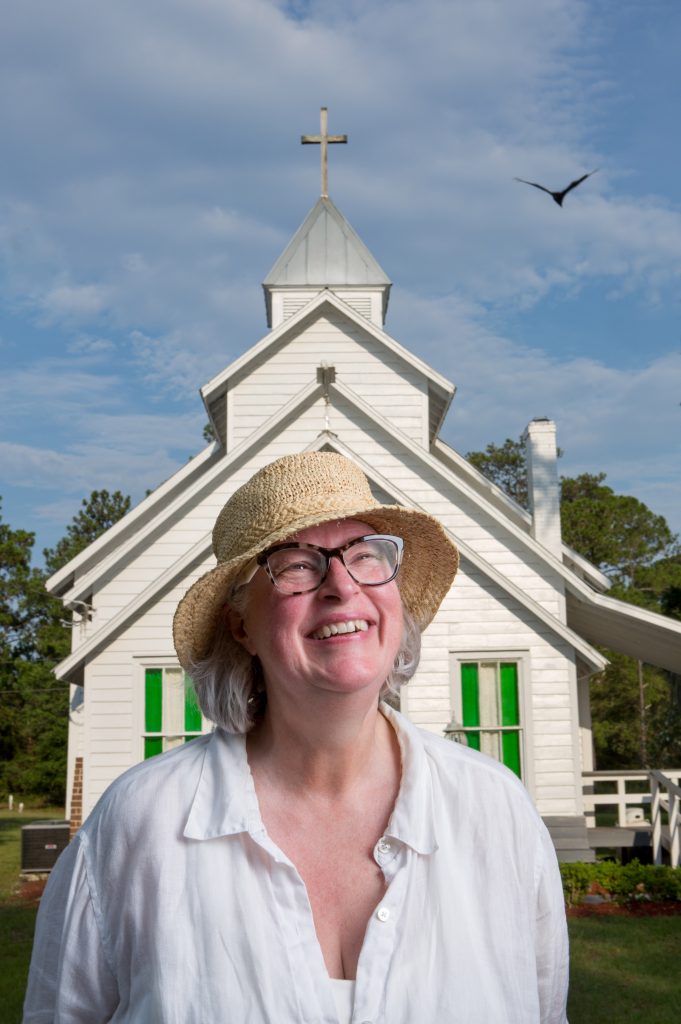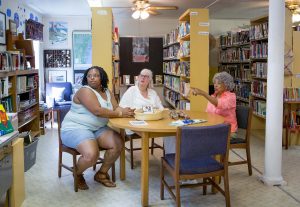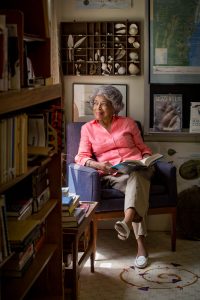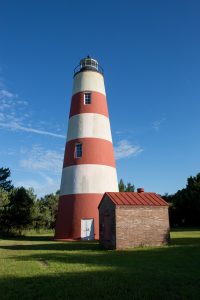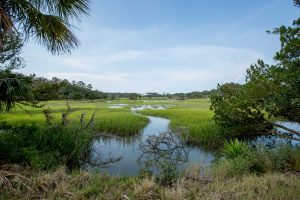Kim Waters
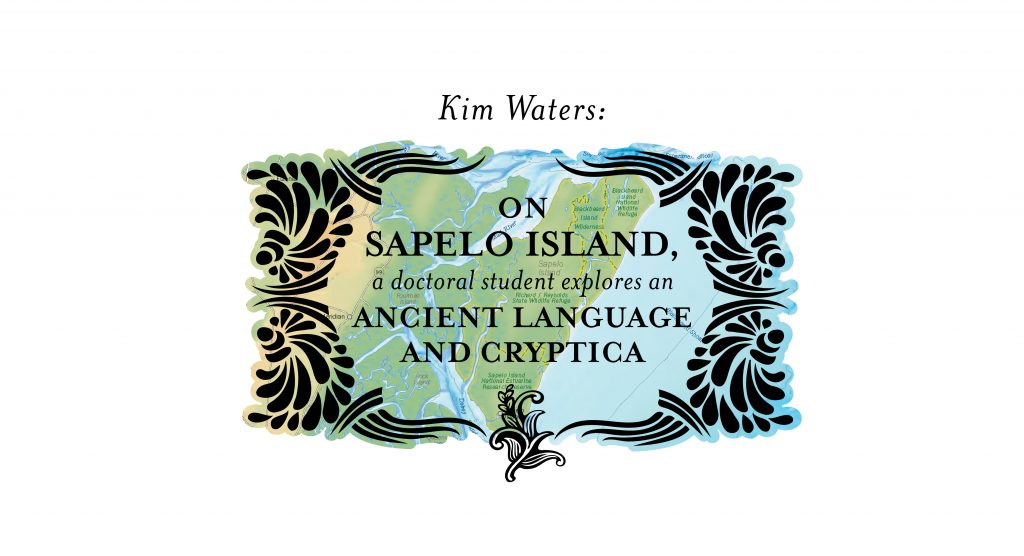
By: Cynthia Adams | Photos By: Nancy Evenlyn
Kim Waters settles into an interview after a wearing day. It began with an early morning ferry crossing and subsequent return to Athens, Ga.
Her journey began early in coastal Georgia at Sapelo Island, where she has been conducting field work in Gullah-Geechee as a linguistics scholar and UGA doctoral student.
At journey’s end, Waters sips tea and reviews her field experiences there and her love of the heritage-rich cultures of African-American communities with citizenry descended from formerly enslaved people. She is getting to know more about the Gullah-Geechee culture and language, which are the backbone of her dissertation work.
Waters tucks her white, chin-length hair behind her ear and grins widely in answer to how she has come to her present doctoral work. After years as a businesswoman in the corporate world where she worked variously as a data analyst, a mathematician, a gallery manager and a watercolor artist, she has become a linguist. She has discovered she much prefers to wear linen over wool business suits.
“I had to take off the corporate monkey suit,” Waters replies. Then, she leans forward, her chin tilted and blue eyes dancing, and allows herself a good laugh.
A conversation with Kim Waters is much more akin to an artist interview than with a former business woman. She says she was just as intrigued by artistic work as something analytical. (For the record, she is still teaching math at the University of North Georgia even as she does field work as a doctoral candidate.)
Waters is as richly imagined as a Flannery O’Connor character.
Born in Gainesville GA, the family moved to Jefferson where her dad was a mortician. “The Ward Brothers opened a funeral home in Cleveland and one in Jefferson,” she explains.
Her father, also a first-responder, drove the ambulance (which was, when necessary, pressed into service as a hearse.) She grew up the oldest daughter, with her brother and younger sister living above the Jefferson funeral home in a three-room apartment above. From childhood, she learned how to answer the phone and calmly take the details of a call.
Waters also learned to be unflappable at an early age. Whenever the phone rang in the funeral home, she knew what to do. “We answered the phone and learned to take directions to the scene of an accident,” she recalls.
She also learned being different was perfectly okay. “They took us to school in a hearse. They had a zipper in the ceiling (of the vehicle) so my father could reach up and put the red ball on top for the ambulance. We played hide and seek in the casket room.”
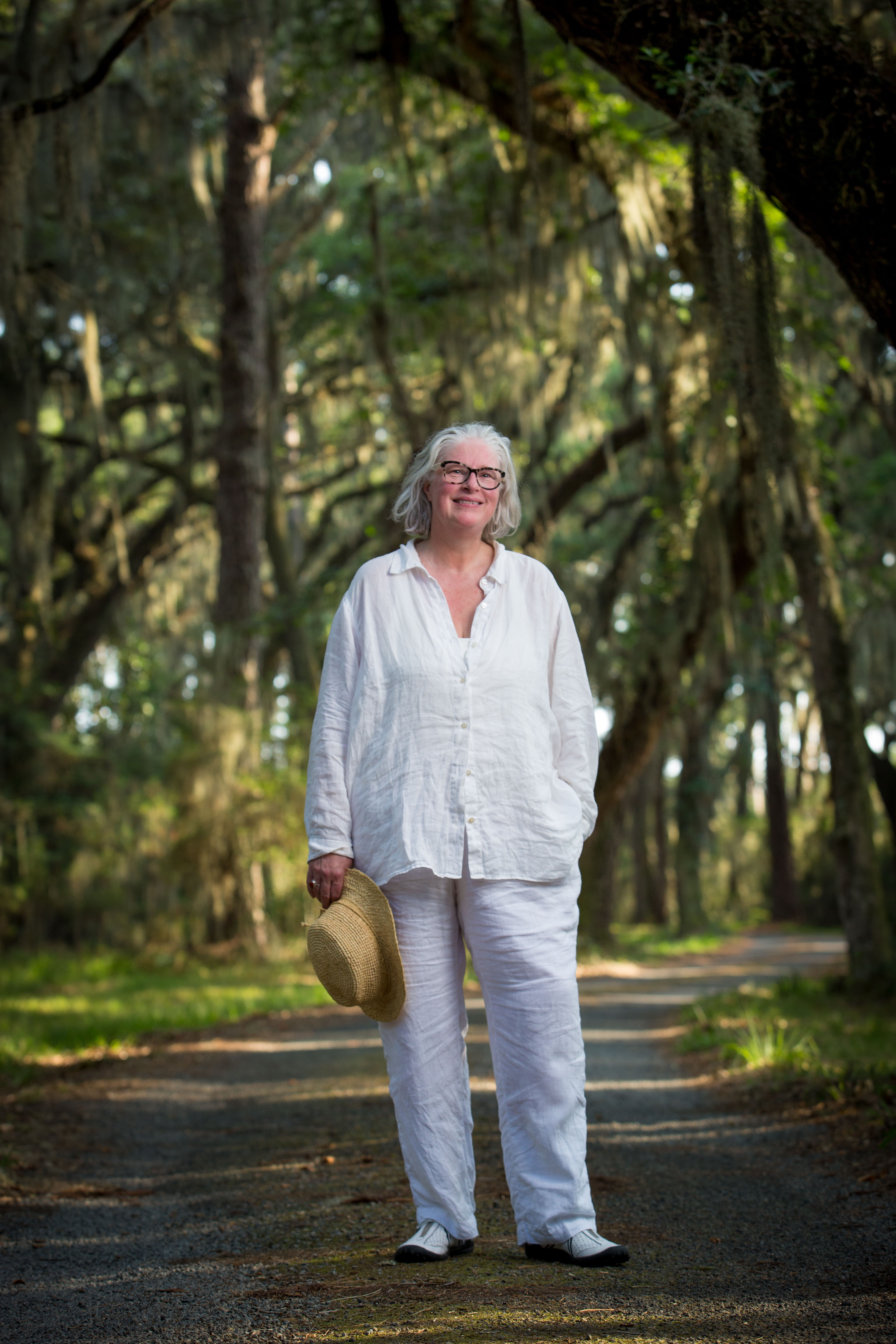
Waters’s father was also the local Coroner. “At Christmas, we’d be opening presents and there would be a shotgun suicide,” she recalls, shaking her head. She doesn’t avert her eyes. “I didn’t believe in ghosts when I was growing up, but since, my sensibilities have broadened.”
Waters was not only learning to be an adaptive young person, she was a good student. After high school, she attended Georgia Tech. Eyes dancing merrily, she jokingly relates that she “married a rocket scientist. He graduated and got a job at General Dynamics. We had our honeymoon at Cape Canaveral.” When their marriage ended, Waters realized she was homesick and returned to Georgia from southern California.
On return, she accepted a job working in the pharmacy at St. Mary’s hospital as a pharmacy tech. The job was short lived, as the hospital’s director of operations took Waters under wing and told her she needed to go to graduate school. Waters took the advice, entering the MBA program at Georgia State. She later earned another degree in health systems.
Waters eventually went to work as a data analyst for a large insurance company. She was head- hunted to Kaiser Permanente. The job was high on status, but low on fulfillment.
She recalls those unfulfilling years. “I did competitive intelligence for them. But, at some point I started water color painting and fell in love with it.” Waters entered some paintings in a contest and won an honorable mention.
“At one point I woke up one day I knew I had to leave. I was done with the corporate monkey suit. I was just done… the commuting from Gainesville could take you four hours to get there and I was working 60 hour weeks.” Waters left the monkey suit behind and put together a gallery in Buford, Ga. Then she got an offer from a Georgia artist colony looking for a financial person.
- Shown is (left to right) library manager Shuntisk Gaskins, Kim Waters and former resident Nettye Handy Evans. All are helpful to Waters’s research at Sapelo.
- Evans was born in New York City but came to Sapelo at 18 months then left for the mainland after 7th grade to continue her education. She finished high school in Norwalk, CT and taught at Pinevale High School in Valdosta, GA. She later returned to the northeast—teaching in Philadelphia and at Dover Air Force Base High School in Delaware. Evans was the first African-American teacher in the two community colleges where she taught (Delaware Technical College and Delaware State College). After retiring, she moved back south, to Brunswick, and continues to volunteer as a board member of the Hog Hammock Public Library and elsewhere, as needed.
It was a step in the direction of her dreams, Waters says. “The job was in Raybun County, in ‘Million Dollar Hollow.’ I met poets writers painters sculptors… it was the most stimulating time of my life.” For Waters, the job revealed “the panoply of the human condition.”
Afterward, she returned to Gainesville College to teach mathematics. Then, Waters realized she wanted more.
“I decided I wanted to get a PhD at age 48.”
What she knew she could not do again was what she calls “soul-numbing work.” Most people, Waters says, are living a job, not a life.
“I hit on linguistics.” It likely had much to do with her grandmother, who told her wonderful stories during Waters’s childhood.
“My grandmother was a history teacher. She always told the stories about the Gullah and the Cherokee. I began to think, ‘What if we could listen to her voice telling those stories?’ That became my offering to the Gullah and the Geechee.”
But, those who knew Waters immediately challenged her, expressing disbelief that she would change disciplines and have to start over.
She laughed at all of this; after all, Waters was the same unflappable young girl that once took emergency calls and played in the casket room of the local funeral home. Perhaps she was afraid of only one thing: a life unfulfilled.
After all, Waters’s father left the mortuary business to become the fire chief in Jefferson, Ga. She was, admittedly, her father’s child.
“I’ve never been afraid of work,” Waters shrugs. “I’ve been working since I was 14. I always had multiple jobs while in school,” she says, and her laughter is so real that it erases any doubt.
In 2010, Waters launched her graduate work in linguistics. She was starting from scratch, she recalls. “I had never had a class in linguistics. For every page I would read in a textbook, I’d look up 20 words. I was learning to parse all those meanings. Nobody told me five classes was a lot, given I was teaching two math classes in Gainesville.”
In order to do both, Waters knuckled down. She cut her sleep from eight hours to only four.
“I would get up at 4:00 a.m. in the morning and start reading…I was an island alone.” And yet, Waters persevered. She finished her masters in 2012 and began her doctoral studies the next year.
“I’m not afraid to work,” she stresses. “I wanted to be a worker bee, not a family bee. I’m just not happy unless I have 500 plates to spin and my hair on fire.”
Meanwhile, as a linguist, she continually drew upon her grandmother’s voice, a voice that shared many stories. The narratives her grandmother told had planted a seed in Waters that was taking root.
Her grandmother’s stories fed Waters cultural curiosity about Native American and other cultures. Waters began to do academic research working with Spanish and Cherokee people. She plunged more deeply into academics, always hungry to learn, and eventually became interested in the Geechee. She decided to record and analyze the Geechee people’s cryptica language.
(In Latin, cryptica means “covered or concealed.”)
Waters was not the first there, but she was the first since electronics went digital.
“The first man to record Geechee, Lorenzo Dow Turner, came down from Harvard (circa 1930) and published in 1949. Turner said there were so many reflexes of African words, there were links.” And yet, as Waters found, “the most surprising thing isn’t that there are so many different aspects to the language but the prosody.” Prosody, by definition, refers to sounds in poetry.
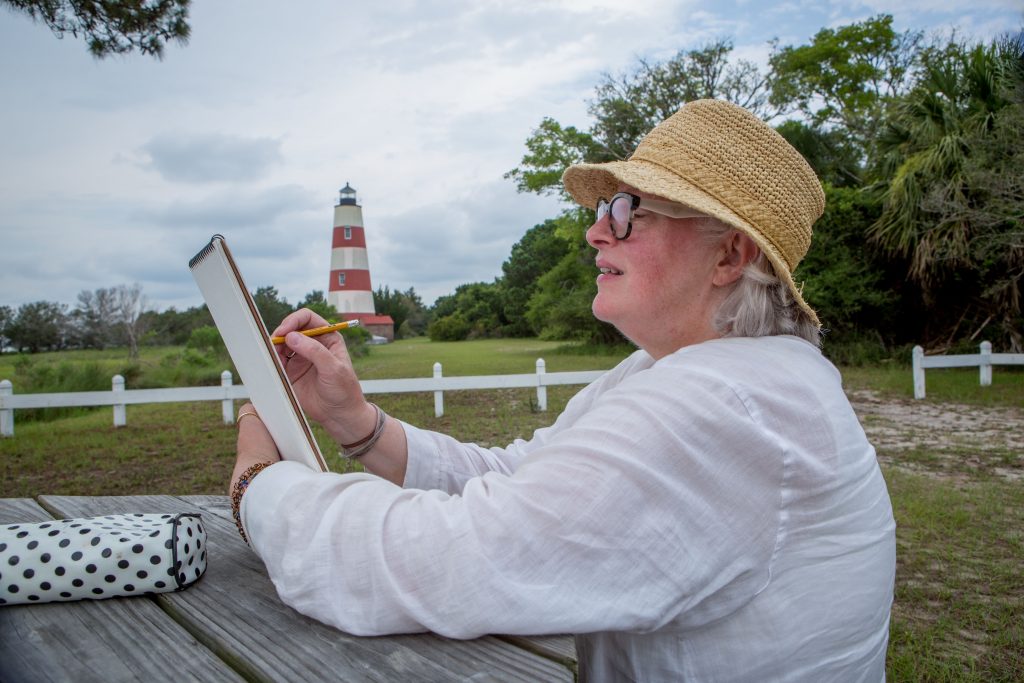
“The translator is not obliged to reproduce the prosody of the original,” Waters observes.
As she analyzed the language, she noted the ways Geechee differed from English, and was surprised. “Nobody has looked at it since the digital age.”
Deep into her dissertation, Waters’s present goal is to record the voices of the Geechee on living on Georgia’s Sapelo Island, in order to examine what linguistics call the prosodic melody, which is essentially the tune, rhythm and sound of the Geechee language.
The undertaking was not a straightforward effort. Not only is Sapelo remote, it was kept remote by choice—the residents had no desire to become just another island tourist destination.
Their privacy was as old as their history. The Gullah were once discrete of necessity, having descended from former slaves who lived in coastal plain and island areas in Georgia and
South Carolina. The Gullah region once encompassed the Cape Fear area on North Carolina’s coast all the way to Jacksonville in Florida. Now, the region is confined to Georgia and South Carolina.
According to the New Georgia Encyclopedia, “Gullah and Geechee culture on the Sea Islands of Georgia has retained ethnic traditions from West Africa since the mid-1700s. Although the islands along the southeastern U.S. coast harbor the same collective of West Africans, the name Gullah has come to be the accepted name of the islanders in South Carolina, while Geechee refers to the islanders of Georgia. Modern-day researchers designate the region stretching from Sandy Island, South Carolina, to Amelia Island, Florida, as the Gullah Coast—the locale of the culture that built some of the richest plantations in the South.”
Both the people and the language they speak are called Geechee. (The Georgia communities include both “Freshwater Geechee” and “Saltwater Geechee”, a designation which references their nearness to the coast.)
“In the case of the Geechee, they identify as salt water (eat salt water fish), or fresh water (fresh water fish), or outland people, who are more agrarian…based upon their diet,” explains Waters.
It was also challenging to go into the field to conduct research and recordings, where Waters found that the native population had long since grown weary of curious outsiders.
As Waters plunged into ethnographic field work within minority cultures, she phoned her childhood friend, Neal Lester, a professor at Arizona State, for advice. She consulted with him on how to penetrate the coastal Georgia Geechee culture. Lester has coached her to be patient and to listen. Trust requires time, he advised; she is learning this, too.
Waters received similar counsel by her doctoral advisor Peggy Renwick. “She’s a gem; she’s telling me that fieldwork dissertations take a long time. ‘Build your relationships in the community.’”
- The hauntingly scenic landscape of Sapelo Island is as beautiful as it is private. Waters feels the spirit of place and the rhythm of its language.
So Waters leans on friends like Lester for help in this as she develops relationships at Sapelo, developing a “rich contact named Cornelia Bailey.” By “rich,” Waters means meaningful.
She also knows her relationship with Lester is rich with meaning. “I met him in 5th grade when we were in school together. We were friends. He was the fi st black PhD in English from Vanderbilt.” Waters convinced him to come to UGA for a Willson Center Fellowship event in September.
Meantime, Waters spent all available time at Sapelo Island, working to build trust with the Gullah-Geechee. By summer’s end, she had begun to make inroads into the island culture.
“I survived the summer, 120 degree heat index and all,” she emailed in August. She had finally succeeded in getting a subject recording—a feat requiring months of patient relationship building.
Geechee evolved as a coded, hidden language, she adds. Innate in the language is a puzzle that allowed former slaves freedom of speech. “In Geechee, ‘his teeth are digging his grave’ translates to: ‘he’s too fat.’” Waters laughs—the analogies delight her. She also admires getting to know the inner world of the Geechee, one which is heavily veiled with a greater meaning.
“The Gullah believe there are three aspects to the human condition, the corporeal, and the soul, and then the spirit…which can walk the earth. This is in the popular press, not academic—the religion of the Sea Island people and the West African who believe in root medicine.” She references Blue Root, a book.
Then Waters adds, “They believe they can command these spirit people.”
She grows quiet; she rose early to meet the ferry to the mainland and as the sun drops she is suddenly tired. Waters then shares a story about her brother. Her brother became a firefighter and died at a young age while in the line of duty. For years afterward, Waters believed she heard her brother’s footsteps coming into the house.
There is a rhythm to everything—to the lapping of sea water beneath a ferry, the remembrance of our loved ones and to the words chosen to describe this— and it hums beneath the surface of language. She has carried Sapelo back with her—the unmistakable spirit of place.
Waters glances outside, momentarily gathering herself.
Just beyond the window, a banana tree is thriving, although it shouldn’t in Georgia’s climate. Yet it does. Waters mentions that she is good with orchids, and friends bring them to her to revive on her back porch. Waters wants me to see them. Something passes across her pale eyes and she continues, saying that she will phone me later. She would like to show me her watercolors and her orchids.
These, she has explained earlier, are things she has saved.
“I love this,” Waters says as she gathers her things to leave, consciously shifting topic. “This is creative. I’m selling science.”
“This” is also how Waters, artist, mathematician, and now scientist, who possesses a creative and curious mind, is saving herself from a life more ordinary.
For Further Reading and Listening
Return of Purple Ribbon Surgarcane on WUGA radio’s On Second Thought at http://gpbnews.org/post/return-purple-ribbon-sugarcane
